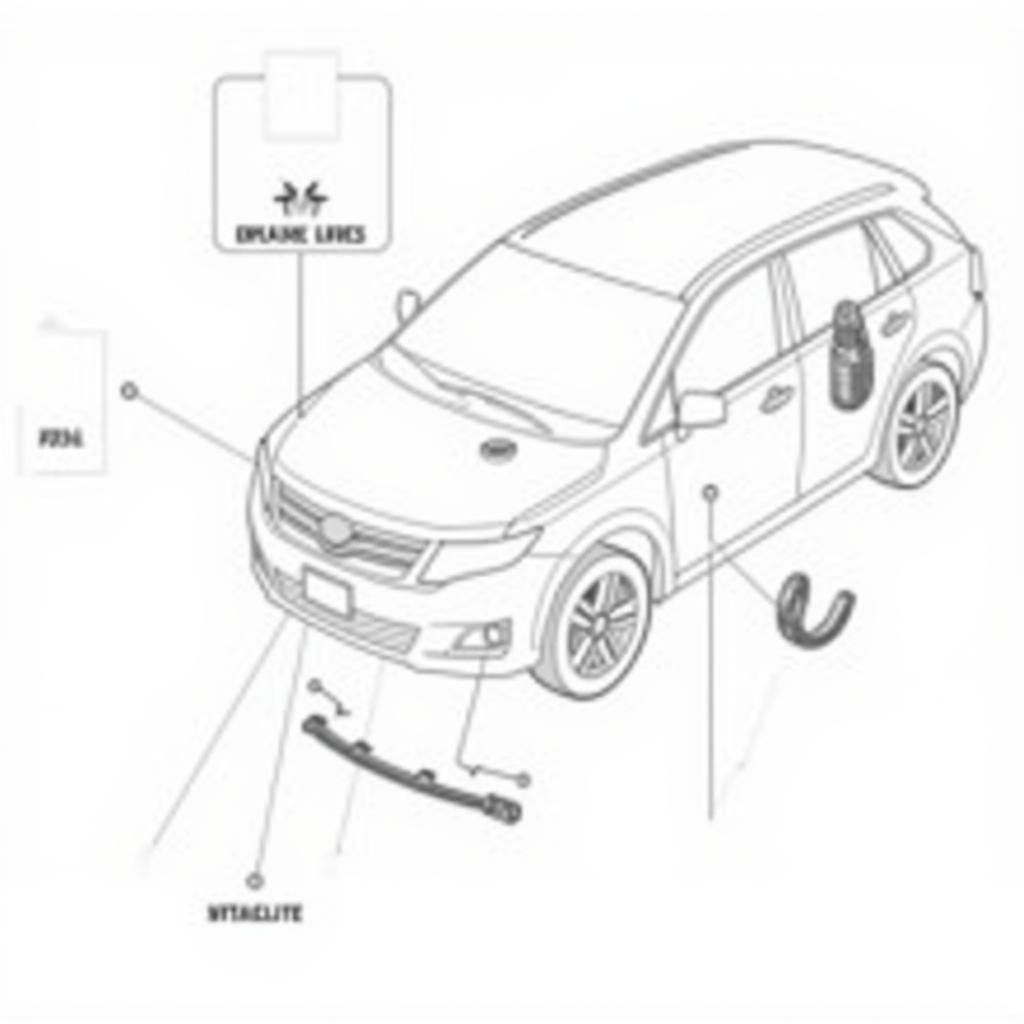If your 2005 Chevy Malibu is displaying a brake fluid warning light, it’s a crucial signal demanding immediate attention. This article delves into the common causes, diagnostic procedures, and solutions for this issue, helping you understand the problem and take appropriate action.
Understanding the Brake Fluid Warning Light in Your 2005 Chevy Malibu
The brake fluid warning light illuminates when the brake fluid level in the master cylinder drops below a safe threshold. This usually indicates a leak somewhere in the brake system or worn brake pads. Ignoring this warning can lead to brake failure, jeopardizing your safety and others on the road. Addressing this issue promptly is paramount for safe and reliable vehicle operation. Understanding the intricacies of your Malibu’s braking system is the first step towards resolving this issue effectively.
Diagnosing the Problem: Where’s the Leak?
Start by visually inspecting the master cylinder, brake lines, calipers, and wheel cylinders for any signs of leakage. Look for wet spots, drips, or stains around these components. A flashlight can be helpful for a more thorough inspection. Remember, even a small leak can lead to a significant drop in brake fluid level over time.
Inspecting your brake pads is also essential. Worn brake pads require more brake fluid to engage, which can trigger the warning light. If you’re unsure about the condition of your brake pads, it’s best to have them checked by a qualified mechanic.
Common Causes of a 2005 Chevy Malibu Brake Fluid Warning
Several issues can trigger the brake fluid warning light in your 2005 Chevy Malibu. Common culprits include leaking brake lines, worn-out brake pads, a faulty master cylinder, or a leak in the wheel cylinders. Identifying the root cause is crucial for effective repair.
Solutions and Repairs: Addressing the Brake Fluid Warning
Once you’ve identified the cause of the low brake fluid, the next step is to address the problem. Depending on the issue, this could involve replacing worn brake pads, repairing or replacing leaking brake lines, or even replacing the master cylinder.
If you’re comfortable working on your car, you might be able to handle some of these repairs yourself. However, if you’re unsure about any aspect of the repair process, it’s always best to consult a qualified mechanic. Brake system repairs are critical to safety, and it’s essential to ensure they’re done correctly.
“Addressing brake fluid leaks immediately is crucial,” advises John Miller, a seasoned automotive technician with over 20 years of experience. “Ignoring the warning light can lead to catastrophic brake failure, putting you and others at risk.”
Remote Diagnostics and Software Solutions
Modern technology has brought innovative solutions for diagnosing and repairing car issues. Remote diagnostics and software solutions allow technicians to access your car’s computer system remotely, identify problems, and even perform software updates and programming fixes to address certain issues. This can be a time-saving and cost-effective solution for some brake-related problems.
Conclusion: Ensuring Your 2005 Chevy Malibu’s Braking System is Safe
The 2005 chevy malibu brake fluid warning is a serious issue that should never be ignored. By understanding the potential causes and taking prompt action, you can ensure your braking system is functioning properly, keeping you and your passengers safe on the road. Remember, regular maintenance and timely repairs are crucial for maintaining a safe and reliable vehicle.
FAQ
- What does the brake fluid warning light mean? The brake fluid warning light indicates a low brake fluid level, potentially caused by a leak or worn brake pads.
- Can I drive with the brake fluid warning light on? It’s extremely dangerous to drive with the brake fluid warning light on as it can lead to brake failure.
- How do I check my brake fluid level? Locate the brake fluid reservoir under the hood and check the fluid level against the minimum and maximum markings.
- What should I do if my brake fluid is low? Add the correct type of brake fluid to the reservoir. If the level drops again quickly, there is likely a leak that needs immediate attention.
- What are the common causes of a brake fluid leak? Leaking brake lines, worn brake pads, a faulty master cylinder, and leaking wheel cylinders are common culprits.
- How much does it cost to fix a brake fluid leak? The cost varies depending on the cause and the necessary repairs. It can range from a simple brake pad replacement to a more complex repair like replacing a master cylinder.
- Can I fix a brake fluid leak myself? Some repairs, like replacing brake pads, can be done DIY. However, more complex repairs should be handled by a qualified mechanic.
“Regular brake inspections are vital for preventing problems and ensuring your safety,” adds Maria Sanchez, a certified automotive instructor specializing in brake systems. “Early detection of potential issues can save you from costly repairs and dangerous situations down the line.” You can learn more about brake light warning light at brake light warning light.

